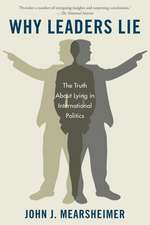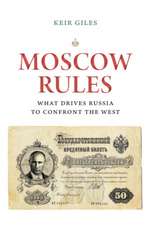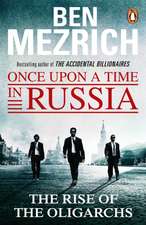The Great Delusion: Liberal Dreams and International Realities
Autor John J. Mearsheimeren Limba Engleză Paperback – 8 oct 2019
A
major
theoretical
statement
by
a
distinguished
political
scholar
explains
why
a
policy
of
liberal
hegemony
is
doomed
to
fail
It is widely believed in the West that the United States should spread liberal democracy across the world, foster an open international economy, and build international institutions. The policy of remaking the world in America’s image is supposed to protect human rights, promote peace, and make the world safe for democracy. But this is not what has happened. Instead, the United States has become a highly militarized state fighting wars that undermine peace, harm human rights, and threaten liberal values at home.
In this major statement, the renowned international-relations scholar John Mearsheimer argues that liberal hegemony—the foreign policy pursued by the United States since the Cold War ended—is doomed to fail. It makes far more sense, he maintains, for Washington to adopt a more restrained foreign policy based on a sound understanding of how nationalism and realism constrain great powers abroad.The Great Delusionis a lucid and compelling work of the first importance for scholars, policymakers, and everyone interested in the future of American foreign policy.
It is widely believed in the West that the United States should spread liberal democracy across the world, foster an open international economy, and build international institutions. The policy of remaking the world in America’s image is supposed to protect human rights, promote peace, and make the world safe for democracy. But this is not what has happened. Instead, the United States has become a highly militarized state fighting wars that undermine peace, harm human rights, and threaten liberal values at home.
In this major statement, the renowned international-relations scholar John Mearsheimer argues that liberal hegemony—the foreign policy pursued by the United States since the Cold War ended—is doomed to fail. It makes far more sense, he maintains, for Washington to adopt a more restrained foreign policy based on a sound understanding of how nationalism and realism constrain great powers abroad.The Great Delusionis a lucid and compelling work of the first importance for scholars, policymakers, and everyone interested in the future of American foreign policy.
Preț: 123.30 lei
Nou
Puncte Express: 185
Preț estimativ în valută:
23.61€ • 24.22$ • 19.88£
23.61€ • 24.22$ • 19.88£
Carte disponibilă
Livrare economică 05-19 februarie
Livrare express 21-25 ianuarie pentru 35.41 lei
Preluare comenzi: 021 569.72.76
Specificații
ISBN-13: 9780300248562
ISBN-10: 0300248563
Pagini: 328
Dimensiuni: 156 x 235 x 23 mm
Greutate: 0.42 kg
Editura: Yale University Press
Colecția Yale University Press
ISBN-10: 0300248563
Pagini: 328
Dimensiuni: 156 x 235 x 23 mm
Greutate: 0.42 kg
Editura: Yale University Press
Colecția Yale University Press
Recenzii
“A
thought-provoking
and
bleak
worldview.”—Gideon
Rachman,Financial
Times(AFinancial
TimesBest
Book
of
2018)
“[An]
accessible
treatise
.
.
.
a
disquieting
critique.”—Publishers
Weekly
“A
dagger
pointed
at
the
heart
of
America’s
governing
philosophy.”—Robert
W.
Merry,The
American
Conservative
“A
closely-reasoned
case
for
the
virtues
of
restraint.”—David
Warsh,Economic
Principalsnewsletter
“A
.
.
.
radical
critique
of
the
liberal
foreign
policy paradigm
as
a
whole.”—Murtaza
Hussain,The
Intercept
“Mearsheimer
believes
that
it
is
folly
for
a
nation-state
to
try
and
remake
and
socially
engineer
a
different
nation-state
in
its
own
image.
.
.
.
[He}
opts
for
clarity
over
ornate
prose:
he
defines
his
terms,
constructs
tight
arguments,
anticipates
and
responds
to
counterarguments.”—Daniel
Kishi,American
Conservative
"Even
dissenters
of
Mearsheimer's
approach
to
an
explanation
of
world
politics
and
American
foreign
policy
will
find
this
book
worthy
of
their
attention
and
consideration
as
a
comprehensive
theoretical
statement
deserving
of
praise."—S.
R.
Silverburg,Choice
“Accessible
and
yet
rigorous, The
Great
Delusion deserves
to
be
read
by
policymakers,
scholars
and
the
public
alike.
.
.
.
The
case
against
liberal
hegemony
as
a
grand
strategy
for
the
United
States
that
Mearsheimer
offers
is
compelling.”—Michael
Lind,National
Interest
"Mearsheimer
has
been
especially
powerful,
including
in
this
new
book,
in
pointing
out
that
too
many
liberal
internationalists
have
failed
to
contend
with
the
enduring
power
of
nationalism
and
identity.
Recent
history
has
proved
him
more
right
and
the
American
foreign
policy
community
more
wrong.”—Jake
Sullivan,Foreign
Affairs
"This
is
the
best
of
the
many
books
that
seek
to
explain
how
and
why
American
foreign
policy
has
gone
so
disastrously
wrong.
Mearsheimer
hits
the
sweet
spot
where
theory
meets
the
chaos
of
today's
world."—Stephen
Kinzer,
author
ofThe
Brothers:
John
Foster
Dulles,
Allen
Dulles,
and
Their
Secret
World
War
"John
Mearsheimer’sThe
Great
Delusionis
policy-relevant
scholarship
at
its
best:
a
summation
of
a
leading
scholar’s
accumulated
thinking
about
international
relations
theory
and
American
foreign
policy."—Christopher
Layne,
University
Distinguished
Professor
of
International
Affairs,
Texas
A&M
University
"Liberal
states
have
many
virtues,
butThe
Great
Delusionexplains,
with
rigorous
logic
and
admirable
clarity,
why
their
efforts
to
spread
their
values
are
usually
doomed
to
fail.
Both
liberal
crusaders
and
unrepentant
realists
have
much
to
learn
from
this
compelling
book.”—Stephen
Walt,
Robert
and
Renee
Belfer
Professor
of
International
Affairs,
Harvard
Kennedy
School
"Idealists
as
well
as
realists
need
to
read
this
systematic
tour
de
force. Even
if
you
don't
agree,
it
will
discipline
your
own
thinking."—Robert
D.
Kaplan,
author
ofThe
Return
of
Marco
Polo's
World:
War,
Strategy,
and
American
Interests
in
the
Twenty-First
Century
Notă biografică
John J. Mearsheimer is the R. Wendell Harrison Distinguished Service Professor of Political Science at the University of Chicago. His many books include Conventional Deterrence. He lives in Chicago, IL.
Descriere
A major theoretical statement by a distinguished political scholar explains why a policy of liberal hegemony is doomed to fail
It is widely believed in the West that the United States should spread liberal democracy across the world, foster an open international economy, and build international institutions. The policy of remaking the world in America’s image is supposed to protect human rights, promote peace, and make the world safe for democracy. But this is not what has happened. Instead, the United States has become a highly militarized state fighting wars that undermine peace, harm human rights, and threaten liberal values at home.
In this major statement, the renowned international-relations scholar John Mearsheimer argues that liberal hegemony—the foreign policy pursued by the United States since the Cold War ended—is doomed to fail. It makes far more sense, he maintains, for Washington to adopt a more restrained foreign policy based on a sound understanding of how nationalism and realism constrain great powers abroad. The Great Delusion is a lucid and compelling work of the first importance for scholars, policymakers, and everyone interested in the future of American foreign policy.
It is widely believed in the West that the United States should spread liberal democracy across the world, foster an open international economy, and build international institutions. The policy of remaking the world in America’s image is supposed to protect human rights, promote peace, and make the world safe for democracy. But this is not what has happened. Instead, the United States has become a highly militarized state fighting wars that undermine peace, harm human rights, and threaten liberal values at home.
In this major statement, the renowned international-relations scholar John Mearsheimer argues that liberal hegemony—the foreign policy pursued by the United States since the Cold War ended—is doomed to fail. It makes far more sense, he maintains, for Washington to adopt a more restrained foreign policy based on a sound understanding of how nationalism and realism constrain great powers abroad. The Great Delusion is a lucid and compelling work of the first importance for scholars, policymakers, and everyone interested in the future of American foreign policy.




















